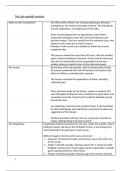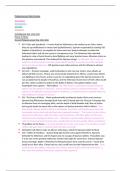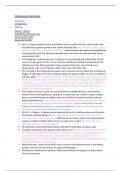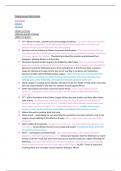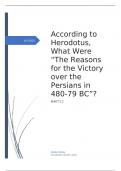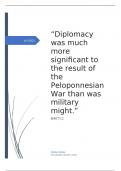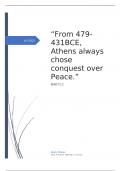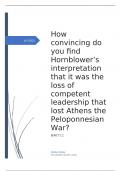OCR • Classics: Ancient History
Latest uploads for Classics: Ancient History at OCR. Looking for Classics: Ancient History notes at OCR? We have lots of notes, study guides and revision notes available for Classics: Ancient History at OCR.
-
24
- 0
-
4
Modules Classics: Ancient History at OCR
Notes available for the following courses of Classics: Ancient History at OCR
- A2 Unit AH3 F393 - Greek History: conflict and culture
- A2 Unit AH4 F394 - Roman History: the use and abuse of power
- A2 Unit CC7 F387 - Roman Britain: life in the outpost of the Empire
- A2 Unit CC8 F388 - Art and Architecture in the Greek World
- A2 Unit CC9 F389 - Comic Drama in the Ancient World
- A2 Unit CC10 F390 - Virgil and the world of the hero
- A2 Unit G3 F373 - Classical Greek Verse
- A2 Unit G4 F374 - Classical Greek Prose
- A2 Unit L3 F363 - Latin Verse
- A2 Unit L4 F364 - Latin Prose
- AS Unit AH1 F391 - Greek History from original sources
- AS Unit AH2 F392 - Roman History from original sources
- AS Unit CC1 F381 - Archaeology: Mycenae and the classical world
- AS Unit CC2 F382 - Homer\'s Odyssey and Society
- AS Unit CC3 F383 - Roman Society and Thought
- AS Unit CC4 F384 - Greek Tragedy in its context
- AS Unit CC5 F385 - Greek Historians
- AS Unit CC6 F386 - City Life in Roman Italy
- AS Unit G1 F371 - Classical Greek Language
- AS Unit G2 F372 - Classical Greek Verse and Prose Literature
- AS Unit L1 F361 - Latin Language
- AS Unit L2 F362 - Latin Verse and Prose Literature
Latest notes & summaries OCR • Classics: Ancient History
A/A* notes summarising the OCR specification, including coinage, direct quotes from the sources, and source references in 24 pages. I recommend these notes as they carried me through my Alevel revision for The Late Republic. Everything you need to know and understand to achieve top grades can be found in these notes! - Olivia
This is the hand written notes going through the timeline of Tacitus and Cassius Dio with analysis
Summative Notes of all the battles/ events in the Peloponnesian Wars between the years 425-404 B.C. (including Lysander, Arginusae etc.)These notes include source quotes, and are great for easily remembering every event on a basic level, and having quote association. Notes were created for Ancient History/Classics A-Level
Summative Notes of all the battles/ events in the Peloponnesian Wars between the years 442-426 B.C. These notes include source quotes, and are great for easily remembering every event on a basic level, and having quote association. Notes were created for Ancient History/Classics A-Level.
Notes spanning the years 480-425BC, covering the events of every battle in the Greco-Peloponnesian Wars (between Athens and Sparta). These notes include direct source quotes. Perfect for easy recall of events and associating quotes. (I created these to study for my Ancient History A-Levels and for me they were a life-saver) - they are still mostly summary, so can use to help develop ideas too.
Posters detailing the changes to the political structure in Athens in the 5th century BCE, including the political bodies, like the assembly and the jury courts, as well as the re-organisation of the tribes in Athenian-owned Attica.
Focusing on the account of Herodotus, his Histories, what reasons did he give for the victory over the Persians during the Graeco-Persian War? This essay is based on a in-depth reading of Herodotus and details the key reasons he gives for the Greek victory over the Persians, and as such is a brilliant example of the sort of analysis required of ancient sources at this level of study.
During the Peloponnesian War, how did each side conduct themselves? Did they prioritise diplomatic methods or military? Did they talk things through or meet on the battlefield? There were many interactions between the Athenians and the Spartans during the Peloponnesian War, some diplomatic and some military. This essay details key examples of both with references to ancient sources to back them up.
In the time period between the Graeco-Persian War and the Peloponnesian War, did Athens always choose peace over war when encountering conflict? This essay details various events in which the Athenians choose either peace or war during this time, with references to back them up.
An important part of academia is assessing modern scholarship and that remains true for this Ancient History module. Drawing on knowledge of the history itself, combined with the skills to pick out and analyse the important parts of the modern scholarship, this essay is a brilliant example of what is expected of these types of questions. This essay in particular analyses the view that the Athenians lost the Peloponnesian War because they lost all their competent leadership.

